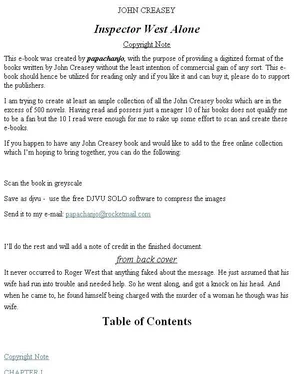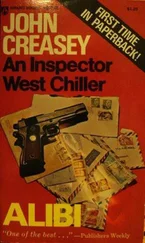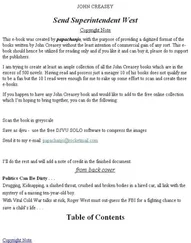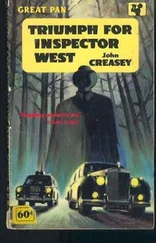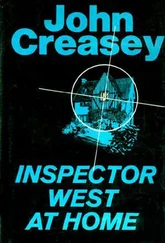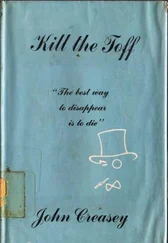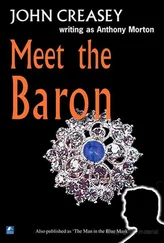John Creasey - Inspector West Alone
Здесь есть возможность читать онлайн «John Creasey - Inspector West Alone» весь текст электронной книги совершенно бесплатно (целиком полную версию без сокращений). В некоторых случаях можно слушать аудио, скачать через торрент в формате fb2 и присутствует краткое содержание. Жанр: Старинная литература, на русском языке. Описание произведения, (предисловие) а так же отзывы посетителей доступны на портале библиотеки ЛибКат.
- Название:Inspector West Alone
- Автор:
- Жанр:
- Год:неизвестен
- ISBN:нет данных
- Рейтинг книги:4 / 5. Голосов: 1
-
Избранное:Добавить в избранное
- Отзывы:
-
Ваша оценка:
- 80
- 1
- 2
- 3
- 4
- 5
Inspector West Alone: краткое содержание, описание и аннотация
Предлагаем к чтению аннотацию, описание, краткое содержание или предисловие (зависит от того, что написал сам автор книги «Inspector West Alone»). Если вы не нашли необходимую информацию о книге — напишите в комментариях, мы постараемся отыскать её.
Inspector West Alone — читать онлайн бесплатно полную книгу (весь текст) целиком
Ниже представлен текст книги, разбитый по страницам. Система сохранения места последней прочитанной страницы, позволяет с удобством читать онлайн бесплатно книгу «Inspector West Alone», без необходимости каждый раз заново искать на чём Вы остановились. Поставьте закладку, и сможете в любой момент перейти на страницу, на которой закончили чтение.
Интервал:
Закладка:
“I wouldn’t want the papers for long; just long enough for them to be photolithoed.”
Roger said: “Well, try Banister. Don’t say I haven’t warned you.”
“I won’t.” Kennedy laughed—that curious laugh with his head back. “Beginning to see what a tower of strength you are to me? I’ve often wondered how much they’ve got on certain friends of mine. This will help me to find out.”
Roger said: “No violence—with Sloan or anyone else.”
“I know where to stop,” said Kennedy. He looked earnest—until Roger glanced round at him from the door, five minutes later. Kennedy was grinning; at the thought of what was going to happen to Bill Sloan. This was like playing with T.N.T. The footman closed the door. Roger crossed the landing, and another door opened. A woman, small, chic, beautiful, looked straight at him. She wore a dinner-gown of black with lace half-revealing her shoulders and the gentle swell of her breast; she wore a tulle scarf, which wisped up at the back of her head. Her hair was corn-coloured. She didn’t smile, but withdrew and closed the door.
Percy was waiting outside in the street.
“Where do you want dropping?” he asked.
“The same place will do.”
Roger got in. A small car parked farther along the road moved after them. He didn’t see it, once he was inside, because the blinds were down, but it was still behind them when he was dropped in Piccadilly. He walked slowly towards the Circus. It was a fine, starry night, with no wind. The lights of London were on again, and the Circus looked gay with the moving advertisements.
A man followed him.
He made no attempt to avoid the man, but walked to his flat. He went upstairs and switched on the light, then went cautiously down again. The man was lounging in a doorway, opposite. So Kennedy—whose name wasn’t really Kennedy—had told Percy that the red light was on: Kennedy was making quite sure that Roger didn’t try any tricks. The telephone was tapped, of course. If he’d made a mistake it was in telling Kennedy that he knew of the dictaphones; but Kennedy had probably already realized that he knew. The risk, the great almost unforgivable risk, was with Sloan.
Sloan was marked down for murder as surely as Lucille had been.
To-night? Possibly to-night, but not if he stayed indoors; this would be another accident, not open murder. Roger stood in front of the telephone, undecided. He could switch off the dictaphone, but a different contraption might be fitted to the telephone itself. He suspected that the other offices in the building were owned by Kennedy, but wasn’t sure. He mustn’t take a risk with that telephone.
How long would the guard remain outside?
He went back upstairs, sorted through a small tool-box in the kitchen, selected several, including a key that would serve as a pick-lock, and then remembered Harry; Harry was usually in by eleven o’clock on his nights off; it was now nearly ten, and an hour wasn’t enough for what Roger wanted to do. He would take a chance by waiting until Harry came back. Roger picked up a book and began to read, but couldn’t concentrate. He switched on the radio; there was hymn singing. He read the Cry article again.
He didn’t like it; he didn’t like seeing the names of Janet, Scoopy, and Richard in print.
Then he heard Harry’s key in the lock.
Harry walked in, smiling sombrely, asked if there were anything Roger wanted, and went to bed; he had a small room which wasn’t included in the main rooms of the flat. Roger waited until the man had had time to undress and get into bed, then went into his own room, adjacent. He hummed to himself as he ran water from the tap, did everything as if he were going to retire. He switched on a small radio; there was dance music. He took fifty pound notes from the safe, then put on a pair of shoes with rubber soles and heels, wrapped up the tools and dropped them into his pocket, switched off the radio, and crept out.
At the front door he paused, to look towards Harry’s door. A line of light showed underneath, but he heard no sound of movement. As an afterthought, he went into the living-room, tore a piece of gummed paper off the wrapping of Mrs. Delaney’s package, and marked it with a pencil. He stuck this at the foot of his door, sealing door to frame. If Harry looked in to see if he were there, the paper would be broken and he would be warned.
He crept downstairs.
Harry hadn’t replaced the guard; the man was still huddled in the doorway.
Roger turned to the ground-floor office of the building and worked on the door with his tools. The lock wasn’t difficult, a policeman could crack a crib with any man if the need were great enough. He fiddled for five minutes before the lock clicked back. There were tell-tale signs at the door, marks of the tools, but they probably wouldn’t be noticed if nothing were stolen. He crept across a large office to the window which overlooked the yard—as did his office upstairs. The window was latched. He unfastened it and pushed the window up, climbed out into the concrete yard and then closed the window. He went to a narrow service alley which led to the next street, walked past the end of Lyme Street and saw the guard, and then averted his eyes quickly, for Percy swung round the corner in the Daimler.
The Daimler pulled up in front of the watcher, who hurried to it and climbed in. The Daimler moved off and was lost in the streets near Co vent Garden. That was reasonable proof that Kennedy relied on Harry to keep a watch on Roger at the flat; and with luck, Harry thought he was in bed. He needed luck. But he had never done anything to arouse Harry’s suspicions and had made no attempt at independent action until to-night. He had to do a lot to-night.
The tools were heavy in his pocket as he went along the Strand, then into a side street where he knew there were telephone booths.
He dialled Sloan’s private number.
He felt shivery as he did so, and as the brrr-brrr sounded. Was Sloan out? The ringing tone seemed unending. If Sloan were out, then he might run into trouble. Brrr-brrr . Sloan must be out, and it was too early for him to be in bed. Brrr-kk .
“Hallo?”
Roger schooled his voice. Sloan might guess it was Rayner, but he couldn’t be sure.
“Mr. Sloan?”
“Yes.”
“I’m warning you, Mr. Sloan. They’re after you.”
“Who——”
“Use your wits. There’ll be an attack. Maybe a rundown. It’ll come quick. I’m warning you, Mr. Sloan.”
“Listen! Who——”
“I’ve warned you, just look out. And there’s another thing, Mr. Sloan.”
“Well?” Sloan had stopped expecting to be told the name of his caller.
“Remember the Copse Cottage job. Girl you never traced. Have a try in Paris. 23 Rue de Croix, District 8. Got that?”
“23 Rue de Croix, 8. Yes. Will you——”
“It’s the same job, and they mean to get you.”
Roger rang off and slipped out of the box. That was as far as he dared go; farther than was safe. He walked to the Strand and beckoned a taxi from the rank near the Savoy.
“Do you know Ealing?”
“Palm of me ‘and, brother!”
“Try and find Merrivale Avenue, will you?”
“Orf the Common, ‘seasy. There an’ back?”
“With a wait in between.”
“It’ll cost yer the world.” The cabby laughed his joke off. Roger sat back, legs crossed, watching the passing lights, letting his thoughts roam. A great deal depended on whether he got back without being missed. He smoked two cigarettes, and was half-way through a third when the cabby slowed down near Ealing Common Station.
“What number, Merrivale?”
“Thirty-five.”
“Okay.”
Number 35 Merrivale Avenue was a small house, standing in a tiny patch of garden, which even under the light of the stars, looked neat and tidy. No lights were on; it was now nearly half-past eleven, and there were few lighted windows in the long street. Roger rang the bell, and waited; rang again and knocked immediately afterwards.
Читать дальшеИнтервал:
Закладка:
Похожие книги на «Inspector West Alone»
Представляем Вашему вниманию похожие книги на «Inspector West Alone» списком для выбора. Мы отобрали схожую по названию и смыслу литературу в надежде предоставить читателям больше вариантов отыскать новые, интересные, ещё непрочитанные произведения.
Обсуждение, отзывы о книге «Inspector West Alone» и просто собственные мнения читателей. Оставьте ваши комментарии, напишите, что Вы думаете о произведении, его смысле или главных героях. Укажите что конкретно понравилось, а что нет, и почему Вы так считаете.
